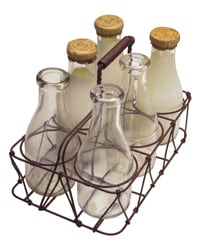How does milk get contaminated? (CDC.gov)
 Milk contamination may occur from:
Milk contamination may occur from:- Cow feces coming into direct contact with the milk
- Infection of the cow's udder (mastitis)
- Cow diseases (e.g., bovine tuberculosis)
- Bacteria that live on the skin of cows
- Environment (e.g., feces, dirt, processing equipment)
- Insects, rodents, and other animal vectors
- Humans, for example, by cross-contamination from soiled clothing and boots
Pasteurization is the only way to kill many of the bacteria in milk that can make people very sick.
What can I contract from raw milk?
- Salmonella: Symptoms include diarrhea, fever, and abdominal cramps, usually lasts 4 to 7 days. Most people recover without treatment. Extreme dehydration may require a hospital visit for fluids.
- E.coli 0157:H7: Most people will experience vomiting and diarrhea that lasts 5-7 days and resolves on its own, however some develop more serious conditions such as hemorrhagic diarrhea (blood loss resulting in anemia, severe dehydration, and possibly death), hemolytic uremic syndrome (may lead to kidney failure and death), thrombotic thrombocytopenic purpura (spontaneous bruising, organ failure and possible death).
- Campylobacter: Mostly causes vomiting, diarrhea, fever, and fatigue. Rarely can cause inflammation in the joints, reproductive organs, urinary tract/organs, and eyes. One in every 1000 reported Campylobacter-related illness results in Guillan-Barre Syndrome that can lead to nerve damage and paralysis (for more visit foodborneillness.com).
- "Q-Fever"/ Coxiella burnetii: The most common symptoms are flu-like symtoms with vomiting, diarrhea, high fever, and lethargy that may last for weeks and may not start for 2-3 weeks AFTER exposure. In more serious cases it can cause pneumonia, inflammation of the liver and heart tissue, miscarriage or pre-mature labor in pregnant women. The bacteria may persist in the person for years and manifest as a chronic disease later in life (for more info visit CDC.gov).
I don't mean to scare you...but are you scared yet? Have I made my point? Please don't drink unpasteurized milk from ANY animal, that means sheep and goats as well. You may not know the effects of this decision for years!

No comments:
Post a Comment